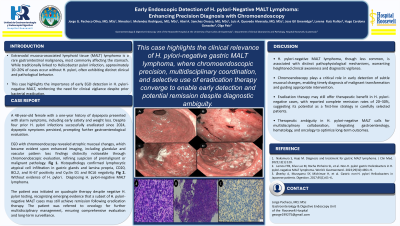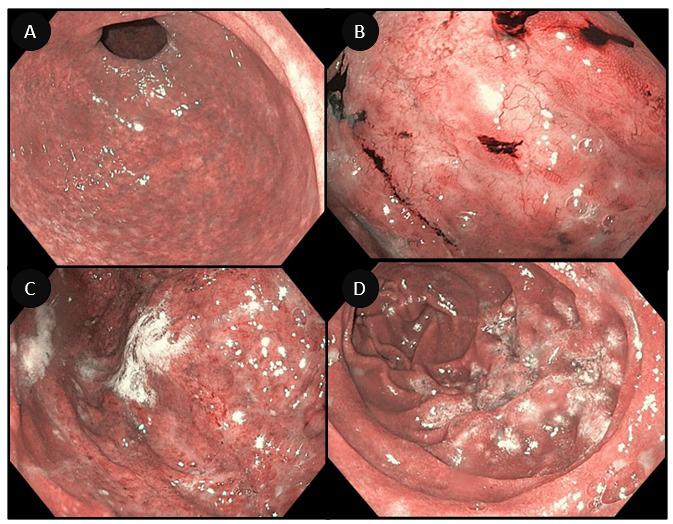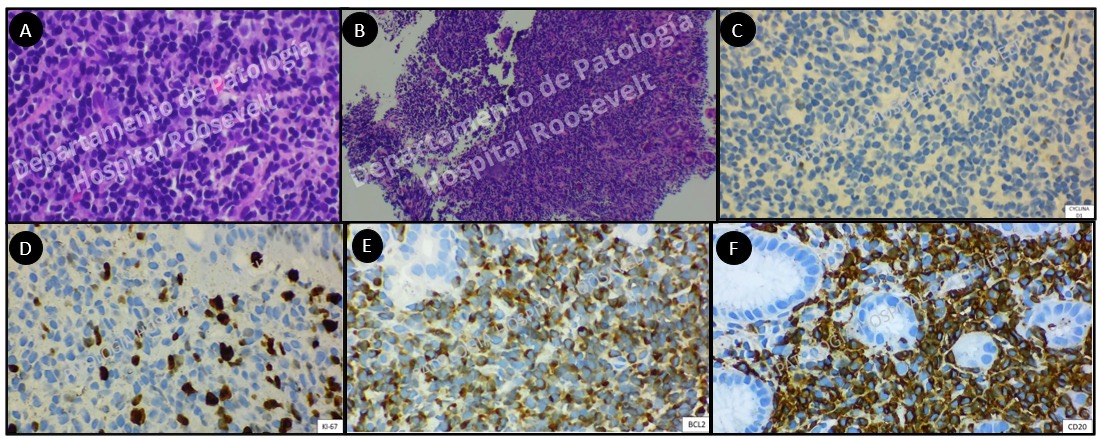Sunday Poster Session
Category: General Endoscopy
P0869 - Early Endoscopic Detection of Helicobacter pylori Negative MALT Lymphoma: Enhancing Precision Diagnosis With Chromoendoscopy
Sunday, October 26, 2025
3:30 PM - 7:00 PM PDT
Location: Exhibit Hall

Has Audio

Abel Sanchez, MD, MSc
Hospital Roosevelt / Gastri-k
Guatemala City, San Marcos, Guatemala
Presenting Author(s)
Jorge Pacheco, 1, Ninoska Meléndez, 1, José Gil, 2, Lorena Ruiz, 2, Hugo Cardona, 2, Olga Paiz, 2, Abel Sanchez, MD, MSc3, Luis Quevedo, 4
11. Gastroenterology and Endoscopy Unit, Hospital Roosevelt Guatemala, Guatemala City, Quetzaltenango, Guatemala; 22. Department of clinical laboratories, and pathology, Hospital Roosevelt, Guatemala City, Chimaltenango, Guatemala; 3Hospital Roosevelt / Gastri-k, Guatemala City, San Marcos, Guatemala; 4Gastroenterology an Digestive endoscopy, Hospital Roosevelt, Guatemala, Guatemala City, Chimaltenango, Guatemala
Introduction: Extranodal mucosa-associated lymphoid tissue (MALT) lymphoma is a rare gastrointestinal malignancy, most commonly affecting the stomach. While traditionally linked to Helicobacter pylori infection, 10–20% of cases occur without H. pylori. Patients frequently present with nonspecific dyspeptic symptoms, making early recognition via esophagogastroduodenoscopy (EGD) and chromoendoscopy crucial for diagnosis and intervention
This case highlights the importance of early EGD detection in H. pylori-negative MALT, reinforcing the need for clinical vigilance despite prior bacterial eradication
Case Description/Methods: A 48-year-old female with a one-year history of dyspepsia and alarm symptoms, including early satiety and weight loss. Despite four prior H. pylori infections successfully eradicated since 2024, dyspeptic symptoms persisted. EGD with chromoendoscopy revealed atrophic mucosal changes, which became evident upon enhanced imaging, including glandular and vascular pattern loss—findings distinctly noticeable through chromoendoscopic evaluation, refining suspicion of premalignant or malignant pathology. Histopathology confirmed atypical cell infiltration in gastric glands and lamina propria, CD20, BCL2, and Ki-67 positivity and Cyclin D1 and BCL6 negativity. Diagnosing H. pylori-negative MALT lymphoma. The patient was initiated on quadruple therapy despite negative H. pylori testing, recognizing emerging evidence that a subset of H. pylori-negative MALT cases may still achieve remission following eradication therapy.
Discussion: This case reinforces the clinical importance of persistent evaluation, particularly in patients with ongoing dyspepsia despite H. pylori eradication. Gastric MALT lymphoma with negative H. pylori testing remains less common. While standard treatment for H. pylori-positive MALT lymphoma relies on bacterial eradication, studies indicate that even H. pylori-negative cases may benefit from quadruple therapy, likely due to unidentified bacterial triggers or immune-mediated mechanisms. Reports estimate that 20–30% of H. pylori-negative MALT cases achieve complete remission after eradication therapy. This case underscores the therapeutic ambiguity surrounding H. pylori-negative MALT, highlighting the need for systematic surveillance and multidisciplinary management. Furthermore, the role of chromoendoscopy in enhancing early recognition of mucosal alterations remains critical in identifying subtle malignant transformations, ensuring timely diagnosis and intervention.


Disclosures:
Jorge Pacheco, 1, Ninoska Meléndez, 1, José Gil, 2, Lorena Ruiz, 2, Hugo Cardona, 2, Olga Paiz, 2, Abel Sanchez, MD, MSc3, Luis Quevedo, 4. P0869 - Early Endoscopic Detection of Helicobacter Pylori Negative MALT Lymphoma: Enhancing Precision Diagnosis With Chromoendoscopy, ACG 2025 Annual Scientific Meeting Abstracts. Phoenix, AZ: American College of Gastroenterology.
11. Gastroenterology and Endoscopy Unit, Hospital Roosevelt Guatemala, Guatemala City, Quetzaltenango, Guatemala; 22. Department of clinical laboratories, and pathology, Hospital Roosevelt, Guatemala City, Chimaltenango, Guatemala; 3Hospital Roosevelt / Gastri-k, Guatemala City, San Marcos, Guatemala; 4Gastroenterology an Digestive endoscopy, Hospital Roosevelt, Guatemala, Guatemala City, Chimaltenango, Guatemala
Introduction: Extranodal mucosa-associated lymphoid tissue (MALT) lymphoma is a rare gastrointestinal malignancy, most commonly affecting the stomach. While traditionally linked to Helicobacter pylori infection, 10–20% of cases occur without H. pylori. Patients frequently present with nonspecific dyspeptic symptoms, making early recognition via esophagogastroduodenoscopy (EGD) and chromoendoscopy crucial for diagnosis and intervention
This case highlights the importance of early EGD detection in H. pylori-negative MALT, reinforcing the need for clinical vigilance despite prior bacterial eradication
Case Description/Methods: A 48-year-old female with a one-year history of dyspepsia and alarm symptoms, including early satiety and weight loss. Despite four prior H. pylori infections successfully eradicated since 2024, dyspeptic symptoms persisted. EGD with chromoendoscopy revealed atrophic mucosal changes, which became evident upon enhanced imaging, including glandular and vascular pattern loss—findings distinctly noticeable through chromoendoscopic evaluation, refining suspicion of premalignant or malignant pathology. Histopathology confirmed atypical cell infiltration in gastric glands and lamina propria, CD20, BCL2, and Ki-67 positivity and Cyclin D1 and BCL6 negativity. Diagnosing H. pylori-negative MALT lymphoma. The patient was initiated on quadruple therapy despite negative H. pylori testing, recognizing emerging evidence that a subset of H. pylori-negative MALT cases may still achieve remission following eradication therapy.
Discussion: This case reinforces the clinical importance of persistent evaluation, particularly in patients with ongoing dyspepsia despite H. pylori eradication. Gastric MALT lymphoma with negative H. pylori testing remains less common. While standard treatment for H. pylori-positive MALT lymphoma relies on bacterial eradication, studies indicate that even H. pylori-negative cases may benefit from quadruple therapy, likely due to unidentified bacterial triggers or immune-mediated mechanisms. Reports estimate that 20–30% of H. pylori-negative MALT cases achieve complete remission after eradication therapy. This case underscores the therapeutic ambiguity surrounding H. pylori-negative MALT, highlighting the need for systematic surveillance and multidisciplinary management. Furthermore, the role of chromoendoscopy in enhancing early recognition of mucosal alterations remains critical in identifying subtle malignant transformations, ensuring timely diagnosis and intervention.

Figure: Figure 1. Upper endoscopy with chromoendoscopy revealing areas of atrophic mucosa, thickened mucosal folds, with loss of glandular pattern and irregular vascular pattern, with a tree trunk and branching pattern.

Figure: Figure 2. A, B: Hematoxylin and eosin staining, showing lymphocytic atypical cell infiltration in gastric glands and lamina propria. Immunohistochemistry confirming gastric MALT. C: Cyclin D1 -, D: Ki-67 proliferation index less than 50%, E: BCL2+, F: CD20+.
Disclosures:
Jorge Pacheco indicated no relevant financial relationships.
Ninoska Meléndez indicated no relevant financial relationships.
José Gil indicated no relevant financial relationships.
Lorena Ruiz indicated no relevant financial relationships.
Hugo Cardona indicated no relevant financial relationships.
Olga Paiz indicated no relevant financial relationships.
Abel Sanchez indicated no relevant financial relationships.
Luis Quevedo indicated no relevant financial relationships.
Jorge Pacheco, 1, Ninoska Meléndez, 1, José Gil, 2, Lorena Ruiz, 2, Hugo Cardona, 2, Olga Paiz, 2, Abel Sanchez, MD, MSc3, Luis Quevedo, 4. P0869 - Early Endoscopic Detection of Helicobacter Pylori Negative MALT Lymphoma: Enhancing Precision Diagnosis With Chromoendoscopy, ACG 2025 Annual Scientific Meeting Abstracts. Phoenix, AZ: American College of Gastroenterology.
